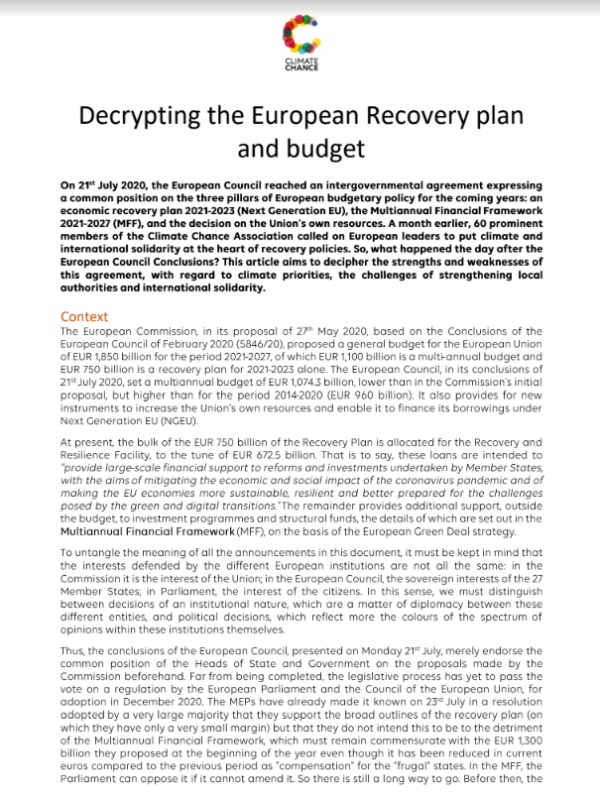
The European Council’s Agreement 21/07: A big step forward, but the road ahead is still long! Climate Chance continues its European advocacy action and decrypts this Agreement…
The agreement of 21st July on the Recovery Plan and on the EU's Multiannual Financial Framework for 2021-2027 was welcomed as an important step forward. Climate Chance has decrypted the strengths and weaknesses of this agreement, with regard to climate imperatives, the challenges of strengthening local authorities and solidarity.
- The European Council’s agreement on the recovery plan and on the European Union’s Multiannual Financial Framework for 2021-2027 was welcomed as an important step forward both from an institutional point of view and in terms of the amount of the sums and their allocation.However, as many observers and the motion voted by a very large majority in the European Parliament have pointed out, there is still a long way to go before these proposals are adopted and, above all, before they really align with the Paris Agreement and the fight against climate change.
- The Climate Chance Association, which brings together all non-state actors involved in this fight, had proposed a set of concrete proposals before the European summit so that all the money mobilized would be useful to save the planet. These proposals are based on the very precise work that the Climate Chance Association’s Observatory on Non-State Climate Action has highlighted the past three years. Please find out more about Climate Chance’s European Adovacy Action from the 17th June here.
- Unfortunately there is still a long way to go before all these proposals are at the heart of this new European dynamic, and this is indeed the aim of the attached work: to present the limits of the European Council’s proposals but mostly, as we have hoped for since the origin of the Association, to make very precise proposals to improve this mechanism. The European Parliament has shown its willingness to be at the forefront, particularly in the negotiation of the Multiannual Financial Framework.We hope that our proposals for improving the compromise of 21st July, which have already been quite widely shared by a number of MEPs, will enable them to support their approach and that of all the actors of European civil society and their representative institutions such as the European Economic and Social Committee and the Committee of the Regions of Europe, which are or will be associated at this essential moment in the life of the European Union and the fight against climate change.

On 21st July 2020, the European Council reached an intergovernmental agreement expressing a common position on the three pillars of European budgetary policy for the coming years: an economic recovery plan 2021-2023 (Next Generation EU), the Multiannual Financial Framework 2021-2027 (MFF), and the decision on the Union’s own resources. A month earlier, 60 prominent members of the Climate Chance Association called on European leaders to put climate and international solidarity at the heart of recovery policies.
So, what happened the day after the European Council Conclusions? Check out our on the decrypting of the strengths and weaknesses of this agreement, with regard to climate priorities, the challenges of strengthening local authorities and international solidarity, which aims to orient future MEP debates around formulated recommendations by the Climate Chance Association on three major topics: the climate, local authorities and international solidarity.


